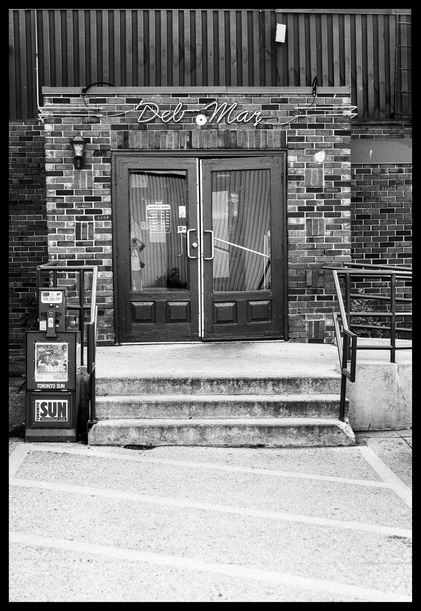
Mornings at the Delmar
B. D. Colen | Ontario, Canada
Photographer: B. D. Colen
Exhibit Title: Mornings at the Delmar
Location: Ontario, Canada
The Delmar is a diner in London, Ontario, an industrial city of about 360,000 that has seen better days. The Delmar is open for lunch, breakfast, and dinner, but it is from opening to about 10:30 a.m. that it is in its glory, a place where everyone knows your face, and regulars and a handful of visitors come for coffee, breakfast, the morning paper, and conversation. In that way it is no different from countless millions of such eating spots around the world.
Magnum photographer Susan Meiselas whose work has taken her around the Globe, once told a group of college students that in seeking documentary projects, they should understand that "far away is not a place." That is, we can find stories to tell in every day places and situations that are so familiar they are unknown, escaping our eyes because our eyes are so used to seeing them.
The Delmar, a diner in London, Ontario, an industrial city of about 360,000 that has seen better days, is just such a place. Half-way between Toronto, to the east, and Detroit, Michigan, to the west, the city is home to Western University, which brings with it the prestige, student body, employment, and economic support such institutions provide a city. But London within the past decade, London has suffered the departure of a Ford assembly line, Kellogs cereals, and McCormick spices. And along with the joys of daily life lived, those employment losses can be seen on the faces of not a few of the Delmar's customers.
The Delmar is open for lunch, breakfast, and dinner, but it is from opening to about 10:30 a.m. that it is in its glory, a place where everyone knows your face, and regulars and a handful of visitors come for coffee, breakfast, the morning paper, and conversation. In that way it is no different from countless millions of such eating spots around the world.
As documentary photographers, we are inclined to worry that if we are not always exposing social ills and injustices, cultures little known, and places rarely visited, battle fields, refugee camps, and the aftermath of earthquakes and floods, we are not making a contribution to humanity or to documentary photography.
But some of the least understood, least thought about, and least documented settings and situations in this world are those right under our collective noses; the give and take of daily family life; the getherings of families at weddings and funerals; the weekly ritual of taking dirty clothes and bedding to the neighborhood laundomat. Or the ritual of Mornings At The Delmar, and all the world's Delmars.
Finally, you will note that there are no capitions accompanying these images. They are absent because I believe the images speak for themselves, and capture the universal, rather than the individual.
A Pulitzer Prize winning former reporter, I have been a photographer for about 65 years, and for 17 of those years I taught documentary photography at the Massachusetts Institute of Technology.
If I had to describe myself as a photographer, I would say that I am a photographer of the mundane, focusing on the daily lives and struggles of individuals and families, in the US and in Low Income Countries.
I have done NGO work in Haiti - four times, and Liberia, and have also photographed for organizations and entities as diverse as The Harvard Stem Cell Institute, CODE Canada, Midwives For Haiti, and The New England Journal of Medicine, as well as for publications including The Boston Globe, Time Mazazine, The Christian Science Monitor, and The Washington Post.
A US citizen, I now live in London, Ontario, and am available for documentary assignments, corporate photography, and weddings, anywhere in the world.
Make Comment/View Comments